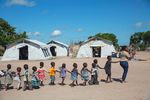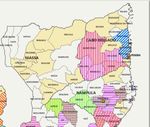Women and girls are disproportionately impacted by disasters and conflict - Dr. Natalia Kanem, UNFPA Executive Director - United ...
←
→
Page content transcription
If your browser does not render page correctly, please read the page content below
Women and girls are
disproportionately
impacted by disasters and
conflict.
Dr. Natalia Kanem, UNFPA
Executive Director
The United Nations Population Fund
MOZAMBIQUE FACT SHEET
for the Northern Province
Humanitarian Crisis:
CABO DELGADO - NAMPULA - NIASSAUNFPA Developing Context
Priorities
(2021 Humanitarian Response Plan)
PREVENT AND RESPOND TO
GENDER BASED VIOLENCE 527,000* internally displaced persons
across three provinces
INCREASE THE AVAILABILITY OF
250,000 displaced women
AND ACCESS TO LIFE-SAVING
SEXUAL AND REPRODUCTIVE
126,480 women of reproductive age
HEALTH SERVICES, INCLUDING
FAMILY PLANNING, (15 - 49)
EMERGENCY OBSTETRIC AND
NEWBORN CARE 14,940 displaced women are pregnant,
with 1,660 expected to deliver within the
month
RESPOND TO COVID-19 AND
MITIGATE ITS SECONDARY
747 pregnant women will experience life-
IMPACTS ON WOMEN AND GIRLS
threatening complications while giving birth
NORTHERN FACT SHEET PAGE 2THE UNITED NATIONS POPULATION FUND (UNFPA) - DECEMBER 2020
Key Concerns
The humanitarian situation in the north of Mozambique (Cabo Delgado, Niassa and Nampula
provinces) continues to worsen, taking a particular toll on women and girls. In crises, women
and girls face an increased risk of gender-based violence, unwanted and unintended
pregnancies, and preventable death due to pregnancy and childbirth complications.
Response Mechanisms to
COVID-19 and Growing
Insecurity in 2020
20,000 women & girls
received sexual & reproductive health and GBV
services through mobile health clinics
317 service providers
and hotline operators trained to provide GBV
services and support in the context of COVID-19.
14 health tents
installed to enable safe access to sexual and
reproductive health services and protect
70,000+ women and girls by adhering to
COVID-19 safety measures.
Overview
More than one year after Cyclone Kenneth’s landfall in May
2019, the humanitarian situation in Cabo Delgado province
3,936 women & girls
has deteriorated due to consecutive climatic shocks, public received dignity kits, with whistles, lights and
health emergencies such as COVID-19 and cholera, and reusable underwear, to support menstrual
growing insecurity, leading to significant displacement, hygiene and mitigate risks of gender-based
disruption of livelihoods and lack of access to basic services violence.
such as health, clean water, sanitation and protection services.
6,455 women & girls
These issues, once localized to the Cabo Delgado province, participated in stress-relief activities in 6
have spread to the neighbouring provinces of Niassa and women-friendly spaces.
Nampula as more people are displaced and people are forced
to move farther to ensure their security. Internal displacement
of people forced from their homes by either violence or 84 health facilities
environmental disaster has displaced nearly 530,000 people providing specialized gender-based violence
across Cabo Delgado, Nampula, and Niassa. services, including clinical management of
rape.
67,000 women & girls
supported with sexual and reproductive health
supplies and equipment through 96
reproductive health kits.
NORTHERN PROVINCE HUMANITARIAN CRISIS - FACT SHEET PAGE 3THE UNITED NATIONS POPULATION FUND (UNFPA) - DECEMBER 2020
UNFPA Humanitarian Work
As of December 31, 2020
Since Cyclone Kenneth in April 2019, UNFPA has supported the Government of Mozambique to provide
humanitarian assistance to more than 230,000 people in Cabo Delgado Province with a focus on provision of
services for sexual and reproductive health and prevention and response to gender-based violence.
UNFPA is also supporting communities displaced by conflict and girls and women facing the impact of the
COVID-19 pandemic.
Nine (9) affected districts in Cabo Delgado are receiving support: Ancuabe, Balama, Chiure, Ibo, Metuge,
Macomia, Mecufi, Montepuez, and Pemba.
UNFPA’s work is driven by the
imperative to achieve transformative
results in Mozambique by 2030:
ZERO MATERNAL DEATHS
ZERO UNMET NEED FOR FAMILY
PLANNING
ZERO GENDER-BASED VIOLENCE AND
HARMFUL PRACTICES.
As we adapt to COVID-19, it's
imperative we protect, promote and
prioritize front-line health workers
who are meeting the urgent sexual,
reproductive, and maternal health
needs of women and girls in
Mozambique every single day.”
- Andrea M. Wojnar, UNFPA
Mozambique Representative
NORTHERN PROVINCE HUMANITARIAN CRISIS - FACT SHEET PAGE 4THE UNITED NATIONS POPULATION FUND (UNFPA) - DECEMBER 2020
Current Multi-Year UNFPA Programmes in Cabo Delgado:
Many of the issues associated with COVID-19 are exacerbated by pre-existing vulnerabilities, enabling UNFPA
to align its COVID-19 response work to current programming working to prevent and respond to gender-
based violence and promote sexual and reproductive health in the northern provinces of Mozambique.
With a dedicated team based in Pemba, Cabo Delgado since 2016, UNFPA has supported the Government's
implementation of the following programmes:
My Choice (2019-2021):
Aims to accelerate efforts to reduce
unwanted pregnancies among adolescent
girls and young women, strengthen health
systems, increase the availability of family
planning services and improve quality of and
access to information.
Focusing on Tete and Cabo Delgado
provinces, by 2021 My Choice aims to support
nearly 530,000 young people.
In both provinces, the couple years of
protection (a measure of contraceptive use)
was more than 3 million versus a national
target of 2.75 million (set by the Government)
Financed by the Government of the
Kingdom of Netherlands
Obstetric Fistula
(2017-2020):
Aims to improve the well-being of women and
girls living with obstetric fistula, informing
communities and families about the condition,
increasing the national capacity for treatment
and routine monitoring, in addition to promoting
activism among women and girls who have
already been treated.
291 fistula repair procedures took place in the
three Northern provinces of Nampula, Niassa and
Cabo Delgado.
Financed by the Government of Canada
NORTHERN PROVINCE HUMANITARIAN CRISIS - FACT SHEET PAGE 5THE UNITED NATIONS POPULATION FUND (UNFPA) - DECEMBER 2020
Kimchi Project
(2015-2019):
Aimed to reduce maternal, neonatal and
infant mortality and morbidity by improving
the availability and quality of maternal and
newborn health services.
40,000 girls and women began using family
planning in Cabo Delgado
Use of family planning methods surpassed
the target of 29% to 34%
Unmet need for family planning was
reduced to 14% surpassing goal of 19.5%
Financed by the Korean International
Cooperation Agency (KOICA)
Government Partners:
Provincial Directorate of Health (DPS)
Provincial Health Services (SPS)
Provincial Directorate of Gender,
Children and Social Welfare (DPGCAS)
Provincial Services for Social Welfare
(SPAS)
Implementing Partners:
UN OCHA, WHO, UNHCR, UNICEF,
Amodefa, Wiwanana, FDC, Muleide.
,
DONORS
NORTHERN PROVINCE HUMANITARIAN CRISIS - FACT SHEET PAGE 6You can also read



























































